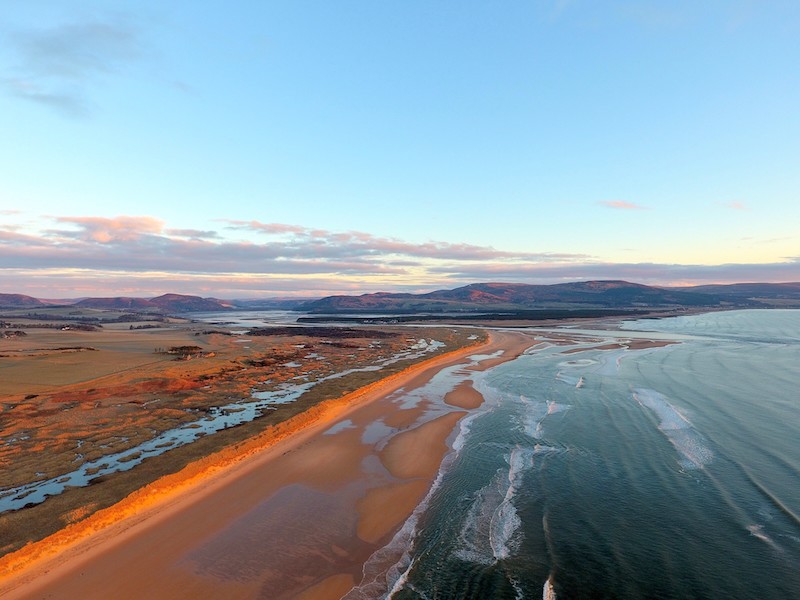The future of one of Scotland’s most precious natural landscapes now rests in the hands of Ministers, as a coalition of leading conservation organisations calls on the public to defend Coul Links from damaging development.
Coul Links, a rare and ecologically rich sand dune system on the East Sutherland coast, is once again under threat from plans to build an 18-hole golf course.
Despite previous efforts to block similar proposals, which were rejected by Scottish Ministers in 2020 a new application submitted in 2023 has brought the issue back to the forefront.
A public inquiry has now concluded, and a decision from the Scottish Government is expected imminently.
Campaigners warn that if approved, the development would cause irreversible harm to an internationally recognised habitat that supports a wealth of rare and endangered species.
The area is part of three overlapping protected designations: a Site of Special Scientific Interest (SSSI), a Special Protection Area (SPA) for birds, and a Ramsar site, reflecting its global importance as a wetland habitat.
Coul Links is home to a stunning array of wildlife, including the critically endangered Fonseca’s Seed Fly, which exists nowhere else on Earth.
Now, a coalition including RSPB Scotland, Buglife, Plantlife Scotland, Scottish Wildlife Trust, Butterfly Conservation Scotland, Marine Conservation Society, and the National Trust for Scotland is urging people to contact MSPs and demand that the site remains protected.
“We fought for Coul Links before, and with help from the public, we won,” said Craig Macadam, Co-Leader and Director of Conservation at Buglife.
“If this development goes ahead, it will have far-reaching and devastating impacts on the important invertebrate communities of Coul Links.
Please stand with us again to protect this special wildlife haven.”
The plans have faced widespread opposition, not only from conservationists and members of the public, but also from NatureScot, the Scottish Government’s own environmental advisers.
Despite this, Highland Council’s planning committee narrowly voted to approve the application, against the advice of its planning officers.
A public inquiry followed, and Scottish Ministers must now weigh the evidence and deliver a final decision.
Dan Hoare, Director at Butterfly Conservation Scotland, added:
“Coul Links is home to a diverse assemblage of butterflies and moths, including several rare and threatened species such as the Northern Brown Argus, Portland Moth and the extremely rare Northern Groundling.
“The development of a golf course will spell disaster for these specialist species that rely on these unique dunes as their home.”
Campaigners are also highlighting the wider context of Scotland’s biodiversity crisis.
According to the latest State of Nature report, 43% of Scotland’s species are in decline, with one in nine at risk of extinction.
Protecting sites like Coul Links is critical to reversing that trend and meeting Scotland’s international commitments, which include protecting 30% of land and sea for nature by 2030.
Stuart Brooks of the National Trust for Scotland said:
“We want everyone in Scotland to continue to be able to access and enjoy this beautiful, wild landscape and we ask that the Scottish Government protects Coul Links from this damaging development.”
Alistair Whyte, Head of Plantlife Scotland, echoed those calls:
“The fact that three legal designations have been put in place to safeguard Coul Links shows how special a place it is.
“Now, more than ever, we must send the message that Scotland cares for its wild places.”
For campaigners, the stakes go far beyond a single planning decision.
“The wildlife we love is being pushed to the brink,” said RSPB Scotland Director Anne McCall.
“For species to recover, we need to protect the places that are most important for nature.
“This unique and protected site is not the right place for a golf course.”
Jo Pike, Chief Executive of the Scottish Wildlife Trust, added:
“We depend on nature in almost every aspect of our lives, and now it’s depending on us at Coul Links.
“By holding the Scottish Government to account on their own ambitions for nature restoration, we can protect Coul Links and help build a nature-positive future.”
With a final decision imminent, the Conservation Coalition is urging members of the public to make their voices heard.
You can add your support by contacting your MSP and signing the petition at this link





